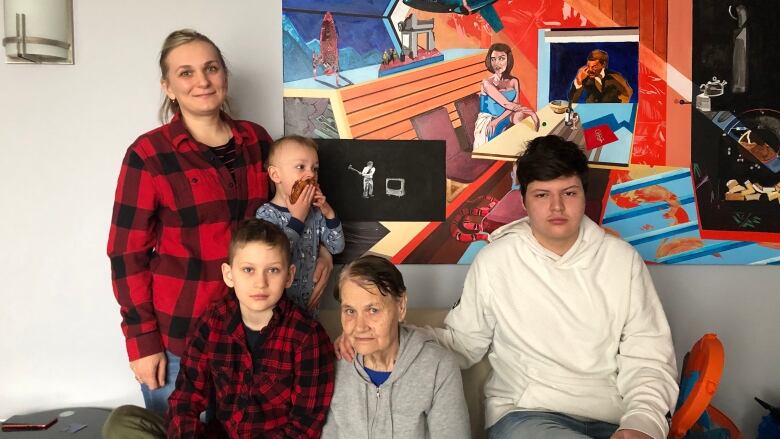Two months after war begins in Ukraine, refugees settle in Edmonton
Illia Kurtin, 17, left Kyiv with his cousins in March to find safety in Canada

Illia Kurtin, 17, flips through images on his cellphone.
There is a video of him and his father biking through empty streets of Kyiv, and of the long lineups of refugees at the Polish border.
Another shows duct-taped windows of a building, another of mattresses in hallways and water jugs in basement shelters.
There's also an image of a cat on a train being evacuated from Ukraine.
Kurtin has been documenting life during the Russian invasion of his home country. He now has more photos on his phone that have been taken since February 24, when the war began, than all of 2021.
These photos now outnumber his belongings.
"I left almost all of my life in Kyiv," he said.
Kurtin left Kyiv with his grandmother Mariya Yushko, cousin Yuliya Boyko and Boyko's sons Lev and Timur.
Their cousin, Slava Francis, supported them from Edmonton as they left the country, crowdsourcing more than $30,000 for flights, accommodation, food and more to help her family make the trip to Canada.
Before they arrived in Canada, the group spent one month in Poland: first in the city of Poznan in the west of the country, then in Warsaw. Francis rented them apartments while they navigated visas.
"It has been quite the process," she said.
"We left in the clothes we stood in and everyone had a backpack containing the essentials," Boyko said.
Her son Timur is 11, while Lev is just two years old. They had no stroller, and walked across the border into Poland.
"My life, in one moment, turned from comfortable into survival mode," Boyko said. "Because you don't know what will happen next."
Their grandmother, Mariya Yushko, arrived in Canada first on a chartered flight from Warsaw to Edmonton.
On April 2, Kurtin, Boyko and her sons landed and moved into a two-bedroom apartment downtown, close to their Edmonton family.
Leaving a war behind
Kurtin spent his first two weeks in Edmonton in quarantine. His school is online and he stays up as late as 4 a.m. for class. His parents hope he will pursue education in Canada.
But he said it's hard to look ahead, as he carries the weight of the past eight weeks.
After war broke out, he helped his family prepare shelters beneath their building. He watched as Ukrainian soldiers set up barricades in the streets. The family slept together in a hallway away from windows and with the lights on.
"This whole 10 days felt for me like one long day," he said. "I thought I would go crazy."

He witnessed a building explode near his house, and while he escaped most of the violence and action, it was hard to watch his community suffer.
"It was [like] nothing I had ever experienced in my life," he said. "There was no bread, no food, and we were sitting in our apartment, [afraid] to look out the windows. It was very scary."
Many of Kurtin's friends remain in the country. Most Ukrainian men aged from 18 to 60 have been banned from leaving in case they are called to fight.
Kurtin says some of his friends are eager to turn 18 and join the Territorial Defence Forces.
"It is very depressing to do nothing," he said.
Francis is helping her cousins adjust, enrolling Timur in school and finding daycare for Lev. Since their arrival, Boyko has begun to look for a job and Kurtin even went to an Oilers game.
"I think it's one of the most Canadian things I could've done," he said.
Not usually a sports fan, Kurtin said it's a challenge to find moments of joy.
"It is really hard to have fun here," he said. "Even going to the hockey game is strange for me because I understand that here everything is secure, there is no war.
"Meanwhile bombs are falling, while I'm sitting at the hockey game."